2020年中考英语一轮复习单元知识点课件七年级下册 Unit 5-6(仁爱版)(共71张PPT)
文档属性
| 名称 | 2020年中考英语一轮复习单元知识点课件七年级下册 Unit 5-6(仁爱版)(共71张PPT) | 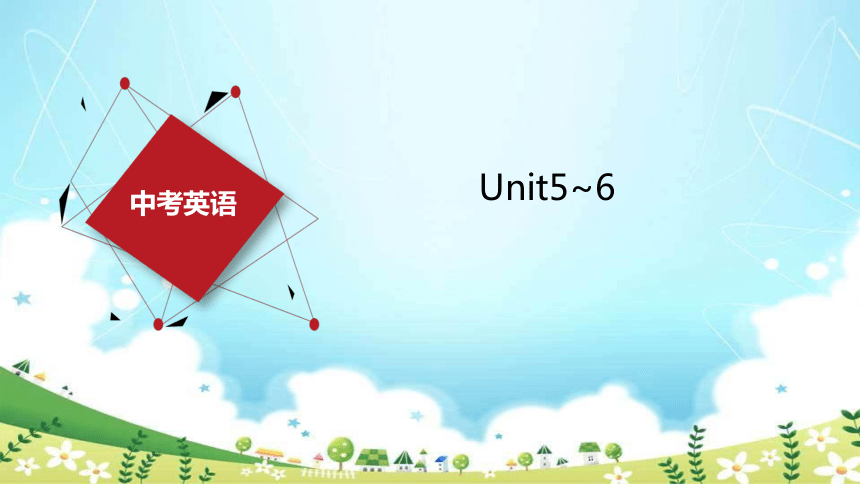 | |
| 格式 | zip | ||
| 文件大小 | 2.6MB | ||
| 资源类型 | 教案 | ||
| 版本资源 | 仁爱科普版 | ||
| 科目 | 英语 | ||
| 更新时间 | 2020-02-14 08:14:31 | ||
图片预览

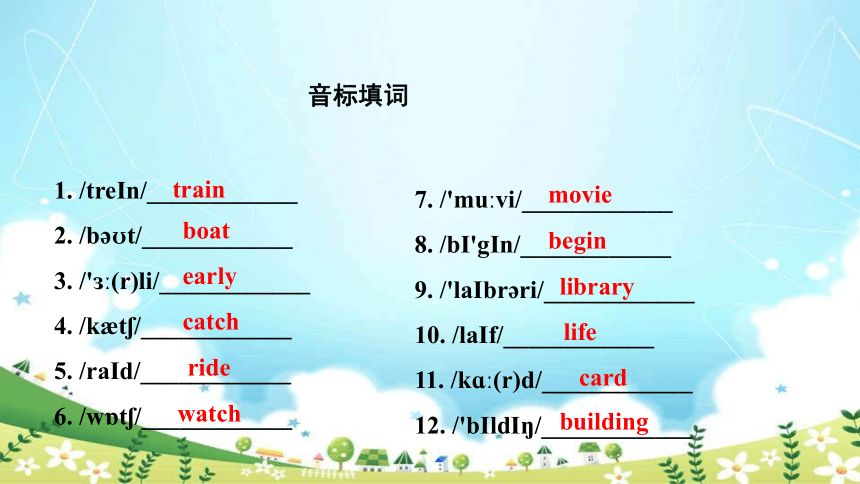
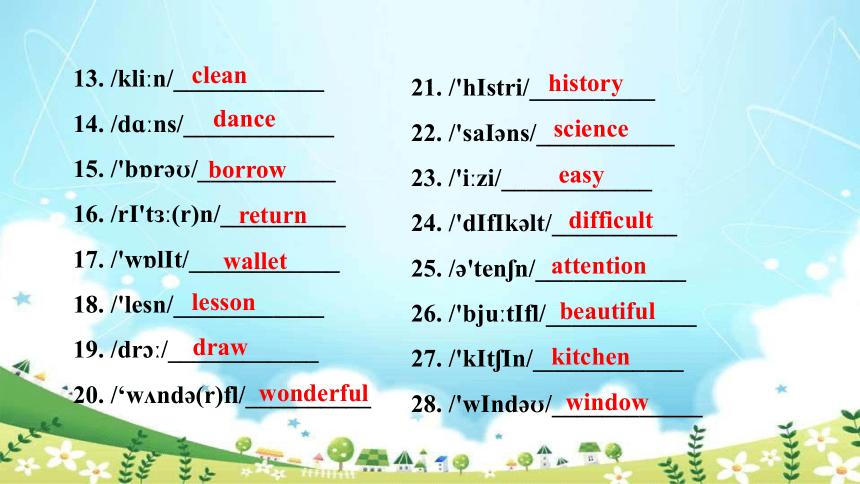
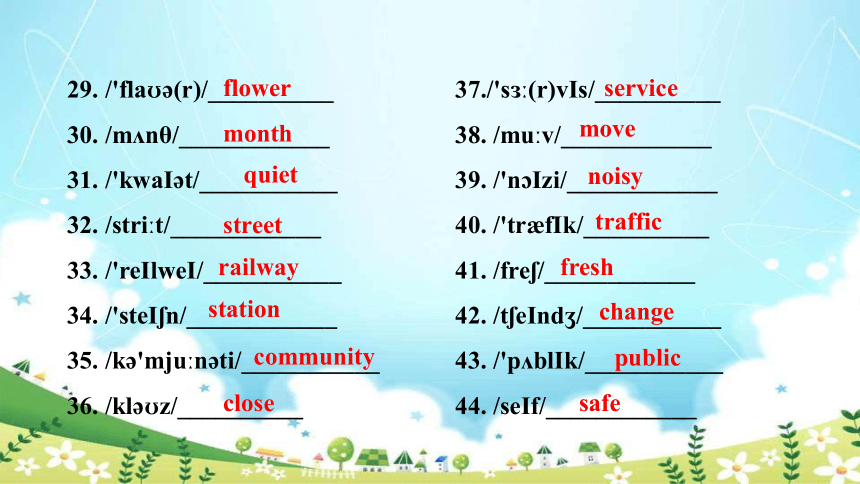
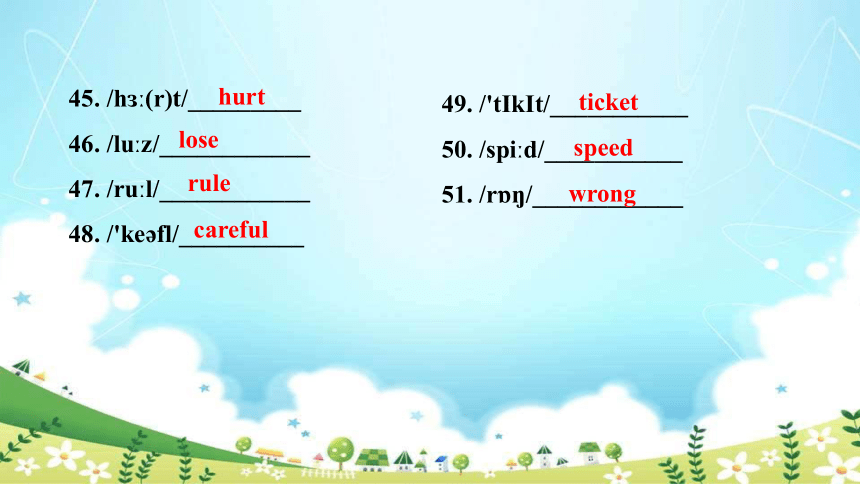
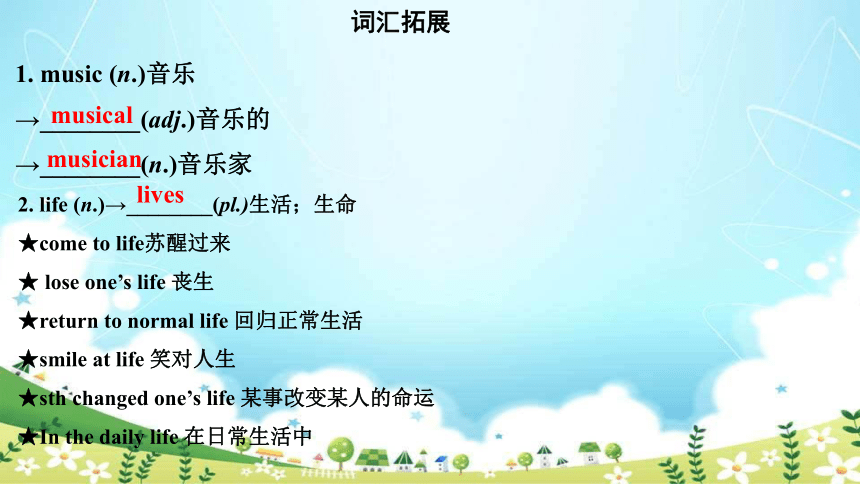
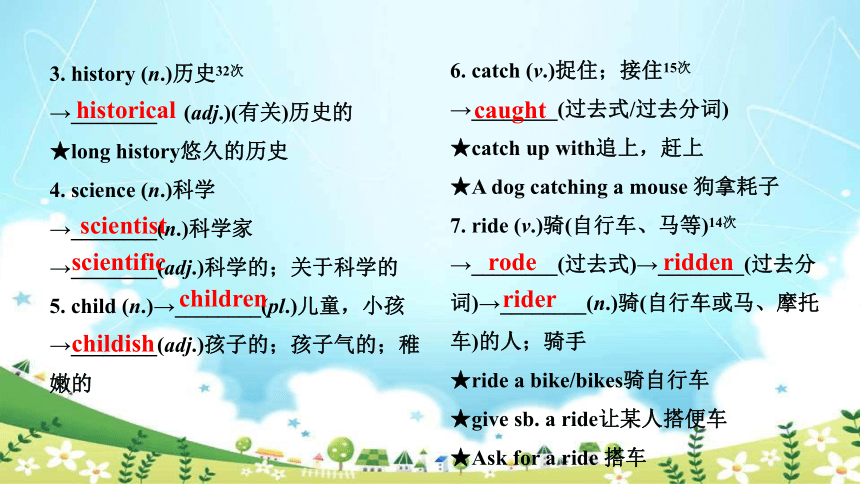
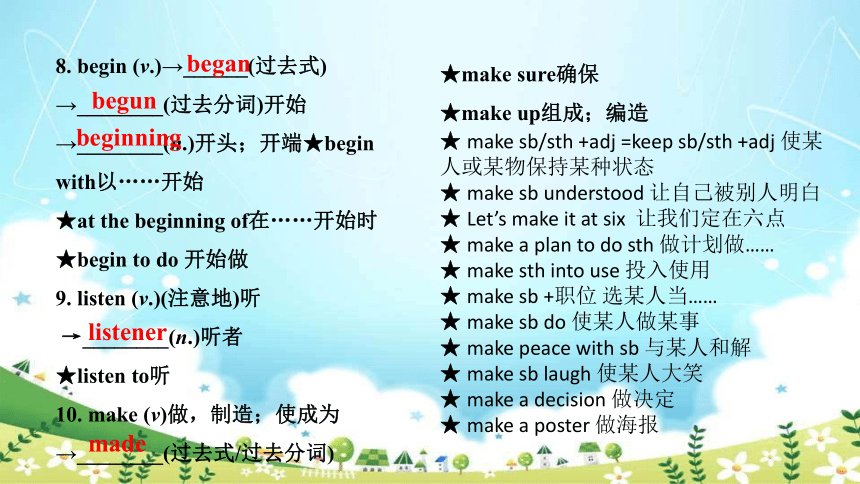
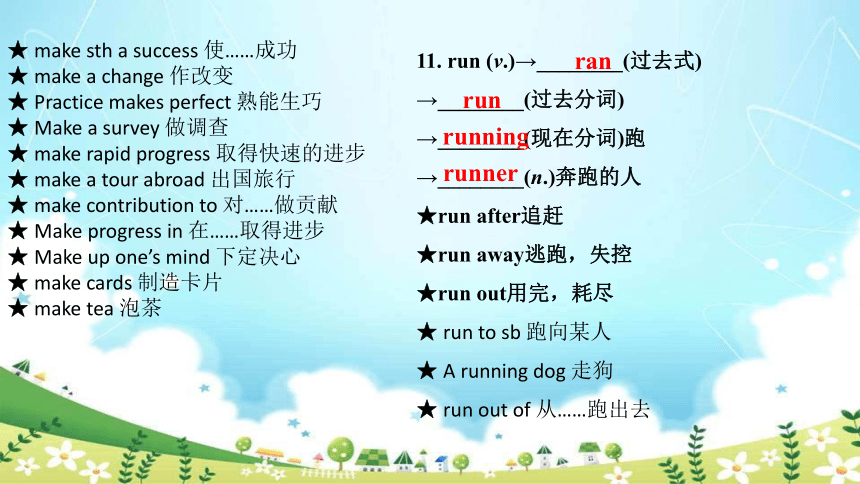
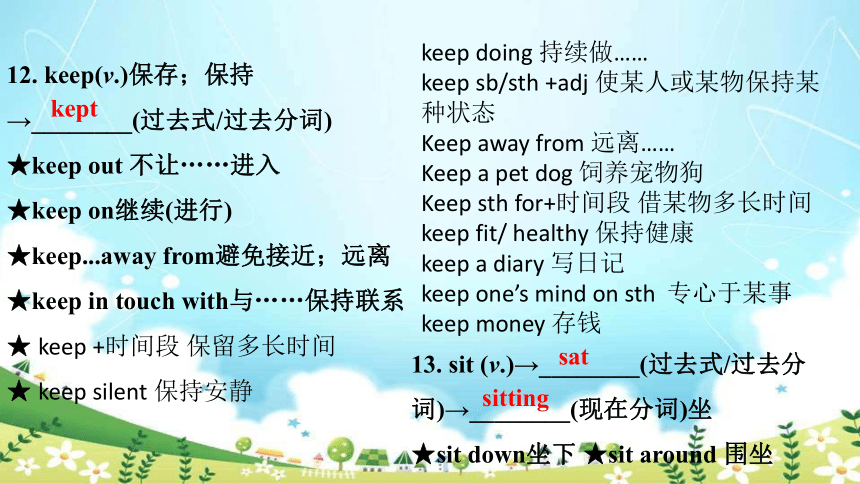
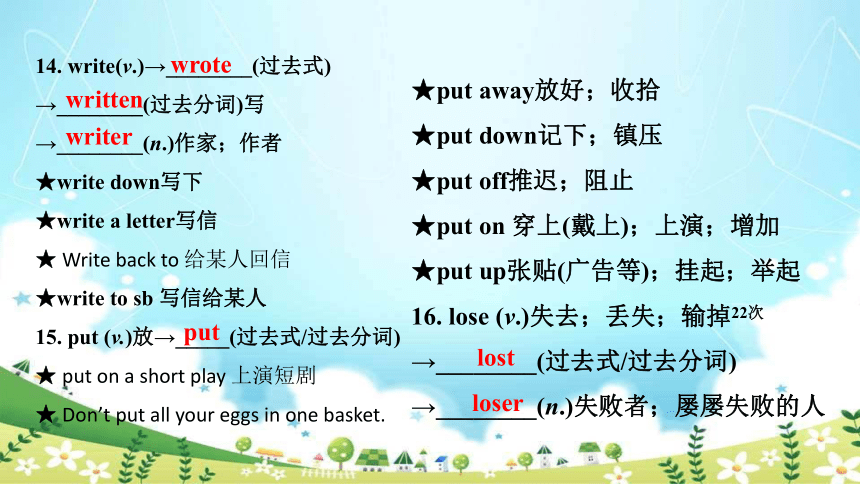
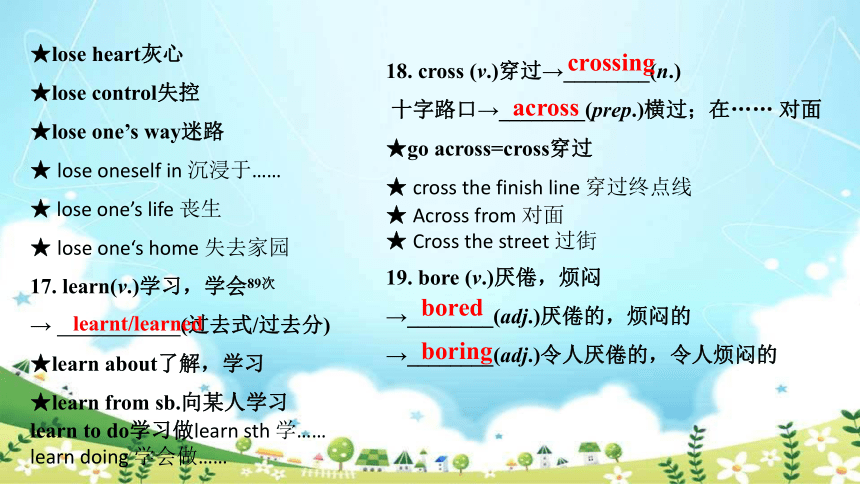
文档简介
课件71张PPT。中考英语Unit5~6音标填词1. /treIn/____________
2. /b??t/____________
3. /'??(r)li/____________
4. /k?t?/____________
5. /raId/____________
6. /w?t?/____________7. /'mu?vi/____________
8. /bI'gIn/____________
9. /'laIbr?ri/____________
10. /laIf/____________
11. /kɑ?(r)d/____________
12. /'bIldI?/____________trainboatearlycatchridewatchmoviebeginlibrarylifecardbuilding13. /kli?n/____________
14. /dɑ?ns/____________
15. /'b?r??/___________
16. /rI't??(r)n/__________
17. /'w?lIt/____________
18. /'lesn/____________
19. /dr??/____________
20. /‘w?nd?(r)fl/__________
21. /'hIstri/__________
22. /'saI?ns/___________
23. /'i?zi/____________
24. /'dIfIk?lt/__________
25. /?'ten?n/____________
26. /'bju?tIfl/____________
27. /'kIt?In/____________
28. /'wInd??/____________
cleandanceborrowreturnwalletlessondrawwonderfulhistoryscienceeasydifficultattentionbeautifulkitchenwindow29. /'fla??(r)/__________
30. /m?nθ/____________
31. /'kwaI?t/___________
32. /stri?t/____________
33. /'reIlweI/___________
34. /'steI?n/____________
35. /k?'mju?n?ti/___________
36. /kl??z/__________
37./'s??(r)vIs/__________
38. /mu?v/____________
39. /'n?Izi/____________
40. /'tr?fIk/__________
41. /fre?/____________
42. /t?eInd?/___________
43. /'p?blIk/___________
44. /seIf/____________
flowermonthquiet streetrailwaystationcommunitycloseservicemovenoisytrafficfreshchangepublicsafe 45. /h??(r)t/_________
46. /lu?z/____________
47. /ru?l/____________
48. /'ke?fl/__________49. /'tIkIt/___________
50. /spi?d/___________
51. /r??/____________hurtloserulecarefulticketspeedwrong词汇拓展1. music (n.)音乐
→________(adj.)音乐的
→________(n.)音乐家2. life (n.)→________(pl.)生活;生命
★come to life苏醒过来
★ lose one’s life 丧生
★return to normal life 回归正常生活
★smile at life 笑对人生
★sth changed one’s life 某事改变某人的命运
★In the daily life 在日常生活中musicalmusicianlives3. history (n.)历史32次
→________ (adj.)(有关)历史的
★long history悠久的历史
4. science (n.)科学
→________(n.)科学家
→________(adj.)科学的;关于科学的
5. child (n.)→________(pl.)儿童,小孩
→________(adj.)孩子的;孩子气的;稚嫩的
6. catch (v.)捉住;接住15次
→________(过去式/过去分词)
★catch up with追上,赶上
★A dog catching a mouse 狗拿耗子
7. ride (v.)骑(自行车、马等)14次
→________(过去式)→________(过去分词)→________(n.)骑(自行车或马、摩托车)的人;骑手
★ride a bike/bikes骑自行车
★give sb. a ride让某人搭便车
★Ask for a ride 搭车scientistscientificchildrenchildishcaughtroderiddenhistoricalrider8. begin (v.)→______(过去式)
→________(过去分词)开始
→________(n.)开头;开端★begin with以……开始
★at the beginning of在……开始时
★begin to do 开始做
9. listen (v.)(注意地)听
→________(n.)听者
★listen to听
10. make (v)做,制造;使成为
→________(过去式/过去分词)
★make sure确保
★make up组成;编造
★ make sb/sth +adj =keep sb/sth +adj 使某人或某物保持某种状态
★ make sb understood 让自己被别人明白★ Let’s make it at six 让我们定在六点
★ make a plan to do sth 做计划做……
★ make sth into use 投入使用
★ make sb +职位 选某人当……
★ make sb do 使某人做某事
★ make peace with sb 与某人和解
★ make sb laugh 使某人大笑
★ make a decision 做决定
★ make a poster 做海报
beganbegunbeginninglistenermade★ make sth a success 使……成功
★ make a change 作改变
★ Practice makes perfect 熟能生巧
★ Make a survey 做调查
★ make rapid progress 取得快速的进步
★ make a tour abroad 出国旅行
★ make contribution to 对……做贡献
★ Make progress in 在……取得进步
★ Make up one’s mind 下定决心
★ make cards 制造卡片
★ make tea 泡茶11. run (v.)→________(过去式)
→________(过去分词)
→________(现在分词)跑
→________(n.)奔跑的人
★run after追赶
★run away逃跑,失控
★run out用完,耗尽
★ run to sb 跑向某人
★ A running dog 走狗
★ run out of 从……跑出去
ranrunrunningrunner12. keep(v.)保存;保持
→________(过去式/过去分词)
★keep out 不让……进入
★keep on继续(进行)
★keep...away from避免接近;远离
★keep in touch with与……保持联系
★ keep +时间段 保留多长时间
★ keep silent 保持安静
keptsatsittingkeep doing 持续做……
keep sb/sth +adj 使某人或某物保持某种状态
Keep away from 远离……
Keep a pet dog 饲养宠物狗
Keep sth for+时间段 借某物多长时间
keep fit/ healthy 保持健康
keep a diary 写日记
keep one’s mind on sth 专心于某事
keep money 存钱13. sit (v.)→________(过去式/过去分词)→________(现在分词)坐
★sit down坐下 ★sit around 围坐
14. write(v.)→________(过去式)
→________(过去分词)写
→________(n.)作家;作者
★write down写下
★write a letter写信
★ Write back to 给某人回信
★write to sb 写信给某人
15. put (v.)放→_____(过去式/过去分词)
★ put on a short play 上演短剧
★ Don’t put all your eggs in one basket.
★put away放好;收拾
★put down记下;镇压
★put off推迟;阻止
★put on 穿上(戴上);上演;增加
★put up张贴(广告等);挂起;举起
16. lose (v.)失去;丢失;输掉22次
→________(过去式/过去分词)
→________(n.)失败者;屡屡失败的人wrotewrittenwriterputlostloser★lose heart灰心
★lose control失控
★lose one’s way迷路
★ lose oneself in 沉浸于……
★ lose one’s life 丧生
★ lose one‘s home 失去家园
17. learn(v.)学习,学会89次
→ (过去式/过去分)
★learn about了解,学习
★learn from sb.向某人学习
learn to do学习做learn sth 学……
learn doing 学会做……
18. cross (v.)穿过→________(n.)
十字路口→________(prep.)横过;在…… 对面
★go across=cross穿过
★ cross the finish line 穿过终点线
★ Across from 对面
★ Cross the street 过街
19. bore (v.)厌倦,烦闷
→________(adj.)厌倦的,烦闷的
→________(adj.)令人厌倦的,令人烦闷的
learnt/learnedcrossingacrossboredboring20. easy (adj.)容易的→________(adv.)容易地,轻易地
★take it easy别紧张,别着急
21. quiet (adj.)安静的→________(n.)安静
→________(adv.)安静地
★keep quiet保持安静 ★keep silent 保持沉默easilyquietnessquietlysafetydangerous22. safe (adj.)安全的→________(n.)安全
→___________ (反义词)危险的
★in danger 处于危险中 ★out of danger 脱险
23. watch (v.)→________(现在分词)观看;当心
(n.)→________(pl.)手表
24. swim (v.&n.)→________(过去式)
→________(过去分词)
→__________(现在分词)游泳
★go swimming去游泳
25. dance (v.& n.)跳舞
→________(过去式/过去分词)
→________(n.)舞者
26. use (v.)用,使用15次
→________(adj.) 有用的,有益的 watchingwatchesswamswumswimmingdanceddanceruseful→________(adj.) 无用的,无效的
→________(adj.) 二手的(n.)用,使用
use sth to do sth 使用某物做某事
use sth 使用某物
be used to doing =get used to doing 适应……
be used to do sth 被用来做……
be used as 被用作……
be used by sb 被某人使用
used to do 过去常常
Be useful to 对……有用
Do something useful to do sth
做有用的事来做……
The use of ……的使用
27. draw (v.)→________(过去式)
→________(过去分词)绘画;抽签
→________(n.)绘画者
(n.)抽签,抽奖★draw a line画一条线
28. sleep (v.& n.)睡觉
→________(过去式/过去分词)
→________(adj.)困倦的,瞌睡的
→________(adj.)睡着的
→________(n.)睡觉者;睡得……的人;卧铺列车★fall asleep入睡
★ have a good sleep 有良好的睡眠uselessusedsleptsleepyasleepdrewdrawndrawersleeper29. close (v.)→________(过去式/过去分词)关,关闭
(adj.)接近的;亲密的18次
★close friends亲密的朋友
★ close to 靠近
30. cost (v.)→________(过去式/过去分词)需付费(n.)费用,花费
★ Sth cost sb +钱、时间+to do sth
★ The cost for sth 为……花费
★ the cost of living 生活花费
31. change (v.)更换;改变
→__________(过去式/过去分词)
→ (adj.)可能变化的;易变的;常变的
★change into转换成;把……变成……
★ sth changed one’s life 某事改变某
★人everything has changed 一切都变了
(n.)找给的零钱closedcostchangedchangeable32. early (adj.)早的;提早的 (adv.)早地;提早
→________(比较级)较早的/地
→________(最高级)最早的/地
★ go to bed early 早点上床睡觉
33. hurt(adj.)(身体上)受伤的
(v.)→________(过去式/过去分词)受伤;感到疼痛
★ be hurt 受伤
★ get hurtearlierearliesthurt1. 到家_________________________________________
2. 上床睡觉_____________________________________
3. 步行_________________________________________
4. 搭乘地铁_____________________________________
5. 搭乘公共汽车回家______________________________
6. 驾车去上班 ___________________________________
___________________________________
___________________________________
7. 参观长城____________________________________
8. 放学以后____________________________________get home=arrive homego to bedon footby subway/undergroundgo home by bus/take the bus homedrive a car to workvisit the Great Wallafter schoolU5T1go to work by cargo to work in a car9. 一会儿___________________________________
10. 在校门口________________________________
11. 看电影__________________________________
12. 在工作日________________________________
13. 听音乐__________________________________
14. 看书____________________________________
15. 了解____________________________________
16. 大约在六点______________________________
17. 在某人空闲时间__________________________see a film / movieon weekdayslisten to musicread a book/booksknow aboutat about six o’clockin one’s free/spare timefor a short timeat the school gate1.在操场____________________________________
2. 打扫______________________________________
3. 写信______________________________________
4. 上英语课__________________________________
5. 画画______________________________________
6. 准时______________________________________
7. 每周______________________________________
8. 在书架上__________________________________
9. 在第一张图中______________________________have an English classdraw a picture/pictureson timeevery weekon the shelfin Picture 1/in the first pictureon the playgrounddo some cleaningwrite a letterU5T210. 等会儿见。 _____________________________
11. 在电话上________________________________
12. 在后面__________________________________
13. 带人参观________________________________
14. 上课____________________________________
15. 在长城上________________________________
16. 与某人交谈______________________________
17. 他的几张相片____________________________have lessons/a lessonon the Great Walltalk to/with sb.some photos of hisSee you soon.on the phoneat the back ofshow sb. aroundU5T21. 在……与……之间______________________________
2. 每个工作日_____________________________________
3. 进行户外活动___________________________________
4. 班会____________________________________________
5. 学校生活________________________________________
6. 了解过去________________________________________
7. 演算数学题______________________________________
8. 谈论_____________________________________________between… and…every weekdaydo outdoor activitiesclass meetingwork on the math problem(s)talk aboutthe school lifelearn about the pastU5T39. 一张中国地图_________________________________
10. 对……友好___________________________________
11. 向……学习___________________________________
12. 一些其他的___________________________________
13. 一点点_______________________________________
14. 努力学习_____________________________________
15. 从……到…… ________________________________
16. 邮展__________________________________________learn from…some othera littlestudy hardfrom… to…Stamp Showa map of Chinabe kind/friendly to…1. 在……的前面________________________________
2. 写信给某人__________________________________
3. 紧挨着___________________________________
4. 在书房___________________________________
5. 上楼_____________________________________
6. 看一看___________________________________
7. 把……收好_______________________________
8. 把……放这里/那里_______________________
9. 在第二层________________________________
10. 照顾_____________________________________next toin the studycome/go upstairshave a look (at)put awayput… here/thereon the second floorlook after=care forin (the) front of…write a letter to sb.U6T111. 进来________________________________________
12. 在……中心__________________________________
13. 一棵苹果树__________________________________
14. 在……左边__________________________________
15. 这么多_______________________________________
16. 在……后面___________________________________
17.(门,窗)在墙上_____________________________
(图片,相片)在墙上_________________________
18.(鸟,人)在树上_____________________________
(树叶,果实,叶子)在树上__________________an apple treeon the left ofin the wallin the treeon the treeat the back of…come inin the center/middle of…on the wallso many1. 停车场_____________________________________
2. 做运动_____________________________________
3. 在街道的拐角_______________________________
4. 在农村_____________________________________
5. 在……的尽头_______________________________
6. 出租_______________________________________
7. 每月……钱以下_____________________________
8. 存钱_______________________________________
9. 把某物以……钱租给某人_____________________
10. 打某人电话________________________________parking lotdo sports=play sports=do exerciseson the street corner in the country(side)at the end of…for rentunder … per monthkeep/save moneyrent sth. to sb. for…give sb. a ring/ ring sb. up/ call sb.U6T211. 带家具的房子______________________________
12. 停车______________________________________
13. 寄信______________________________________
14. 向某人求助________________________________
15. 离……很近________________________________
16. 离……很远________________________________
17. 在许多地区________________________________
18. 三口之家__________________________________
17. 社区服务中心______________________________
18. 从某地搬到…… ___________________________a house with furniturepark a car/carsmail a letter/letterscall sb. for helpbe close to…be far from…a community service centermove from somewhere to…in many areasa family of three1. 过桥________________________________________
2. 公用电话____________________________________
3. 去车站的路__________________________________
4. 继续走______________________________________
5. 在交通灯处__________________________________
6. 在(街,路等)的对面________________________
7. 沿着……走__________________________________
8. 在……拐角__________________________________go across the bridge/cross the bridgea public telephonethe way to the stationwalk onat the traffic lightsacross from…go along=walk along=go down/upon the corner of…U6T39. 在左边____________________________________
10. 失去生命_________________________________
11. 需要做某事 _______________________________
12. 保证安全__________________________________
13. 换乘2路公交车_____________________________
14. 受伤______________________________________
15. 禁止右转。 _______________________________
16. 禁止停车。 _______________________________need to do sth.keep safechange to the No. 2 bus get hurtNo right turn.No parking.on the left lose one’s life17. 交通事故__________________________________
18. 遵守交通规则______________________________
19.看两边____________________________________
20. 在街上玩__________________________________
21. 我们所有人________________________________
22. 超速罚款单________________________________
23. 不要迟到。________________________________
24. 小心______________________________________traffic accidentsobey the traffic ruleslook both waysplay on the streetall of usa ticket for speedingDon’t be late.be careful1. — ____do you usually come to school?
“你通常怎样上学?”
—I usually come to school _________.
“我通常骑自行车上学。”Howby bikeon footby boatby bikeby airby planeby carby shipby trainby busby subway How 用来提问交通方式。常见的交通方式有: U5考点解析by underground【辨 析】⑴by指以某种手段或通过某种方式,常为 “by+交通工具” 。此时,既不能在名词前加限定词,也不能把名词改为复数形式。
如:My brother goes to school by bike.
⑵take +冠词+交通工具。
如:You can take a bus to go there.
⑶当交通工具前有限定词(冠词和物主代词等)时用in/on +冠词+交通工具,in接小型交通工具,如: in a car等。on接大型交通工具(骑自行车除外)。如: on a bus, on his bike等。
如:She’ll go to Beijing on a plane. ① Tom often go to school______a bus.
on B. by C. to
② We could ______ the subway to visit the museum.
A. take B. ride C. sit 单位次数:
一天一次__________ 一周两次___________
一年三次_______________ How often意为“多久,多经常”,用来提问做事情的______。
频率(度)副词:(常放在:动前be后)
n____,s______,s________,o___,u_____, a_____ 2. ____________________________? 你多久去一次图书馆?How often do you go to the library频率evereldomometimessuallylwaysftenonce a daytwice a weekthree times a year【辨 析】⑴look强调 “看”的动作,是有目的地“看”。单独使用时,用来引起对方的注意;如果跟宾语,要和at连 用。
如: Look! Tom is over there. / Look at the blackboard, please.
⑵see强调“看”的结果,意为“看见,看到”。
如: How many birds can you see in the tree?
⑶watch强调 “专注地看”,意为 “观看,注视”,有欣赏 的意味,常用于看电视、看球赛等。
如: Do you watch TV at night?
⑷read表示“看”时实指 “阅读”,常用于看书、看报 等。
如: I like reading at home. ① My brother and I are __________a football game.
A. seeing B. reading C. watching D. looking
② I can __________a cat in the room.
A. see B. read C. watch D. look
③ My father often __________newspaper on weekdays.
A. sees B. reads C. watches D. looks
④ Please __________the blackboard and listen to me carefully.
A. see B. look at C. watch D. look
4. The girl looks ___the books ____________.
“那个女孩在书架上找书。”foron the shelveslooked for 区别:
look for 意为“寻找”,强调动作过程 find 意为“找到”,强调结果 (find还有“发现、感到”等意思)e.g. I _________my key everywhere, but I couldn’t ____ it.
我到处找我的钥匙,但就是找不到。find5. _________________them? “我能借多久?”How long用来提问“for+一段时间”;
keep 表示“保存,保持”,这里理解为“借”。
e.g. I can _______the bike ____two weeks.
这辆自行车我可以借用两个星期。How long can I keep keepfor① Jim often _______books from the library or his friends.
A. keeps B. borrows C. buys
②—Can you _____me your ruler?—Sorry, I left it at home.
A. borrowed B. lend C. kept6. ________________________.
“你必须准时归还(它们)。”You must return them on timegive sth.back to sb ⑴ return sth. to sb. 把某物归还给某人
=________________.
⑵_____________=come back to…回到……
return to+地点 e.g.我也是一名老师。 _______________. =________________.7. I _______________it one day.
我也想有一天去那里参观。also want to visit I am also a teacherI am a teacher, too区别:also是比较正式的用语,它经常放在句中,并置于行为动词之前,助动词、情态动词或系动词之后。
too是普通用语,多用于口语,常置于句末,它前面可用逗号,也可不用。one day:指过去或将来某一天 可用于过去时态或将来时态
some day:指将来某一天 用于将来时态8. —Excuse me, _________________English workbooks?
“请问,我可以借一些英语练习本吗?”
—Of course / Sure.“当然可以。”
may I borrow some do you have any —Excuse me, ______________English newspapers?
“请问,你有英语报纸吗?”
—Sorry, I don’t have…“对不起,我没有……”9. A few students are running around the playground.
“一些学生正在操场上跑步。” ⑴ few, a few与可数名词复数连用。
few具有否定意味,表示“很少,几乎没有”;
a few修饰可数名词,意为“几个”。
⑵ little, a little与不可数名词连用。
little具有否定 意味,表示“很少,几乎没有”;
a little修饰不可数名词,意为“一点儿”。用few, a few, little, a little 填空。⑴In our school, ______ students like English, but ______ of them can speak English smoothly.
. ⑵He invited some classmates to come to his party,but _______ came.
⑶We need to go shopping. There is_________ juice left in the fridge.
⑷Give me ______ time more and I’ll think it over.little fewa fewa little few10. Here are some photos of his.
=Here are _______________ .
“这里有一些他的相片。”some of his photos My favorite subject is…
=___________
“我最喜爱……”U6考点解析What is your favorite subject ?
=__________________________?
“你最喜爱的学科是什么(是哪一科)?”Which subject do you like bestI like…best.2. You _________English very much.
“你一定非常喜欢英语。”
must“一定”,表示肯定的猜测。
must like e.g. ________________.
“他一定在家。”He must be at home ⑴come/go upstairs“上楼”
____________“下楼”3.Why not __________and __________?
“为什么不上楼看一看呢?”go upstairs have a lookgo downstairs(2) Why not+动词原形+……?
是提建议的一种表达法,类似_________________Why don’t you + 动词原形+……?这样的句型常用来启发或建议某人做某事。
回答常用:
Ok, let’s… /All right. / That’s a good idea.4. Don’t ____________. _____________, please. 不要把它们放那儿。请把它们收好。put them therePut them away put away的用法: ①代词作宾语,应放在put 和away的_____。
e.g. put it away / put them away“把它/它们收好。” ②名词作宾语,可放在_____,也可放在_____。
e.g. put the book away
= put away the book“把书收好。”中间后面中间 类似的短语还有: ________, _______ 等。put on try on5. I love _____________________in the study.
“我喜欢在书房玩电脑。”playing on the computer ⑴__________________
意为“玩电脑(在电脑上进行娱乐活动)”play with 其后接人时,意为“与……玩”
其后接物时,意为“玩……(单纯地玩耍)”
e.g. __________________“玩电脑游戏”play on the computerplay computer games ⑵ 进行球类活动不加the。
e.g. __________________ “踢球”
__________________ “打篮球”
__________________“打排球”play football/soccerplay basketballplay volleyballplay the guitarplay the piano ⑶ 玩乐器一定要加the 。
e.g. _____________“弹吉他”
_____________“弹钢琴”6. There ____(is, are) a lamp and some books on the desk.
桌子上有一盏台灯和几本书。
There ____(is, are) some books and a lamp on the desk.
桌子上有几本书和一盏台灯。isare There be 结构中:
be动词的单复数取决于离be动词最近的主语,即遵循“就近原则”。7. _________________________________.
“书架上有这么多的书。”There are so many books on the shelves “so many+_______________”“这么多”
e.g. _________________“这么多杂志” “so much+____________” “这么多”
e.g. ______________“这么多牛奶”可数名词复数不可数名词so many magazinesso much milk8. There are two students _________ the classroom.
在教室前面有两个学生。in front of in front of 意为“在……的前面” (在范围外的前面)
in the front of 意为“在……的前面”(在范围内的前面)
e.g. There is a tree __________the classroom.
教室前面有一棵树。(树在教室外)
The teacher is standing ____________ the classroom.
老师站在教室的前面。(老师在教室里)in front of in the front of There is a car____ the classroom.
A. in B. in the front of C. in front of 1. 邻居对你说新年快乐,你应该这么回答:
______________.
2. 你想知道同桌通常是如何到校的,可以这么问:
_____________________________?
3. 你经常乘坐地铁来上学,你可以这么表达:
________________________________________.
4. 你想知道Lucy多久去一趟图书馆,可以这么问她:
______________________________?The same to you情景交际How do you usually come to schoolI usually come to school by subway/undergroundHow often do you come to the library5. 你一周去两趟阅览室,你可以这么表达:
________________________________.
6. 你想向新邻居借用自行车,你可以这么说:
_________________________________?
________________________________?
7. 你想知道这本字典可以借用多久,可以这么问:
___________________________________________?
8. 工作人员告诉你借走的杂志要按时归还,他会这么说:
_________________________________.I go to the reading library twice a weekExcuse me, may I borrow/use your bikeExcuse me, can you lend me your bikeHow long can I keep the DictionaryYou must return the magazine(s) on time9.你想告知表弟门后有一个篮球,你可以这么说:
__________________________________________.There is a basketball behind/at the back of the door10. 你想知道这附近是否有银行,你可以这么问路人:
__________________________________?
11. 你向警察打听如何才能在半小时内到达动物园,你可以这么问:
__________________________________________?
12. 你在十字路口向路人询问哪个方向是去博物馆,你可以这么问:
____________________________________?Excuse me, is there a bank near hereExcuse me, how can I get to the zoo in half an hourExcuse me, which is the way to the museum13. 你想让对方告诉你去体育馆的路,你可以这么问:
_________, could you tell me ________________?
14. 你告诉游客巴士公交站离这里大约有500米的路程,你可能会这么说:
__________________________________________.Excuse methe way to the gymThe bus station is about 500 meters away from here15. 你想知道今天星期几,可以这么问同学:
_________________?
16. 你想知道Mary每周有几节英语课,可以这么问她:
__________________________________________, Tina?
17. 有人问你对数学的看法,你认为数学难但是有趣,可以这样表达:
_____________________________.What day is it todayHow many English lessons do you have every weekI think maths is difficult and interesting18. 你想知道同桌为何最喜欢跑步,可以这么问:
_________________________?
19. 车站人来人往,你提醒你同学要照看好他自己的物品,你可以这么说:
________________________________.
20. 你喜欢空闲时间在书房玩电脑,你可以这么表达:
In my free time_______________________________________.
21. 你的手表出故障了,你可以这么告诉修表师傅:
__________________________________.Why do you like running bestYou must/should look after your thingsI love/like playing on the computer in the studyThere is something wrong with my watch22.书桌上有一盏台灯、一台电脑和一些书等等,你可以这么描述:
On the desk ________________________________________.
23. 第一幅图中没有任何树木,你可以这么描述:
___________________________________________.
24. 你想知道床铺底下是否有鞋子,可以这么问妈妈:
_____________________________?
25. 你想知道书桌上有多少飞机模型,可以这么问:
______________________________________?there is a lamp, a computer, some books and so on There aren’t any trees in Picture 1/in the first picture Are there (any) shoes under the bedHow many model planes are there on the destkbook, shelf __________________________________.There are many/a lot of books on the shelf|看图写话|favorite, subject __________________________.
__________________________.My favorite subject is history|看图写话|History is my favorite subject Swim, now ______________________________________.The boy is swimming now|看图写话| _______________________.soccer __________________________.There is a soccer under the chairThe soccer is under the chair|看图写话|busy, harvest __________________________.The farmers are busy harvesting ___________________________.The farmers are busy with harvest|看图写话| girl, born ____________________________.The girl was born on June 5th|看图写话|bird _________________________.There is a bird in the tree|看图写话|wash, moment__________________________________________. Mom is washing clothes at the moment|看图写话|how often, you_________________________________?How often do you go to Shanghai by ship|看图写话| 上海Sally, usually, home_______________________________________.Sally usually goes home by bus after school|看图写话|THANKS“”
2. /b??t/____________
3. /'??(r)li/____________
4. /k?t?/____________
5. /raId/____________
6. /w?t?/____________7. /'mu?vi/____________
8. /bI'gIn/____________
9. /'laIbr?ri/____________
10. /laIf/____________
11. /kɑ?(r)d/____________
12. /'bIldI?/____________trainboatearlycatchridewatchmoviebeginlibrarylifecardbuilding13. /kli?n/____________
14. /dɑ?ns/____________
15. /'b?r??/___________
16. /rI't??(r)n/__________
17. /'w?lIt/____________
18. /'lesn/____________
19. /dr??/____________
20. /‘w?nd?(r)fl/__________
21. /'hIstri/__________
22. /'saI?ns/___________
23. /'i?zi/____________
24. /'dIfIk?lt/__________
25. /?'ten?n/____________
26. /'bju?tIfl/____________
27. /'kIt?In/____________
28. /'wInd??/____________
cleandanceborrowreturnwalletlessondrawwonderfulhistoryscienceeasydifficultattentionbeautifulkitchenwindow29. /'fla??(r)/__________
30. /m?nθ/____________
31. /'kwaI?t/___________
32. /stri?t/____________
33. /'reIlweI/___________
34. /'steI?n/____________
35. /k?'mju?n?ti/___________
36. /kl??z/__________
37./'s??(r)vIs/__________
38. /mu?v/____________
39. /'n?Izi/____________
40. /'tr?fIk/__________
41. /fre?/____________
42. /t?eInd?/___________
43. /'p?blIk/___________
44. /seIf/____________
flowermonthquiet streetrailwaystationcommunitycloseservicemovenoisytrafficfreshchangepublicsafe 45. /h??(r)t/_________
46. /lu?z/____________
47. /ru?l/____________
48. /'ke?fl/__________49. /'tIkIt/___________
50. /spi?d/___________
51. /r??/____________hurtloserulecarefulticketspeedwrong词汇拓展1. music (n.)音乐
→________(adj.)音乐的
→________(n.)音乐家2. life (n.)→________(pl.)生活;生命
★come to life苏醒过来
★ lose one’s life 丧生
★return to normal life 回归正常生活
★smile at life 笑对人生
★sth changed one’s life 某事改变某人的命运
★In the daily life 在日常生活中musicalmusicianlives3. history (n.)历史32次
→________ (adj.)(有关)历史的
★long history悠久的历史
4. science (n.)科学
→________(n.)科学家
→________(adj.)科学的;关于科学的
5. child (n.)→________(pl.)儿童,小孩
→________(adj.)孩子的;孩子气的;稚嫩的
6. catch (v.)捉住;接住15次
→________(过去式/过去分词)
★catch up with追上,赶上
★A dog catching a mouse 狗拿耗子
7. ride (v.)骑(自行车、马等)14次
→________(过去式)→________(过去分词)→________(n.)骑(自行车或马、摩托车)的人;骑手
★ride a bike/bikes骑自行车
★give sb. a ride让某人搭便车
★Ask for a ride 搭车scientistscientificchildrenchildishcaughtroderiddenhistoricalrider8. begin (v.)→______(过去式)
→________(过去分词)开始
→________(n.)开头;开端★begin with以……开始
★at the beginning of在……开始时
★begin to do 开始做
9. listen (v.)(注意地)听
→________(n.)听者
★listen to听
10. make (v)做,制造;使成为
→________(过去式/过去分词)
★make sure确保
★make up组成;编造
★ make sb/sth +adj =keep sb/sth +adj 使某人或某物保持某种状态
★ make sb understood 让自己被别人明白★ Let’s make it at six 让我们定在六点
★ make a plan to do sth 做计划做……
★ make sth into use 投入使用
★ make sb +职位 选某人当……
★ make sb do 使某人做某事
★ make peace with sb 与某人和解
★ make sb laugh 使某人大笑
★ make a decision 做决定
★ make a poster 做海报
beganbegunbeginninglistenermade★ make sth a success 使……成功
★ make a change 作改变
★ Practice makes perfect 熟能生巧
★ Make a survey 做调查
★ make rapid progress 取得快速的进步
★ make a tour abroad 出国旅行
★ make contribution to 对……做贡献
★ Make progress in 在……取得进步
★ Make up one’s mind 下定决心
★ make cards 制造卡片
★ make tea 泡茶11. run (v.)→________(过去式)
→________(过去分词)
→________(现在分词)跑
→________(n.)奔跑的人
★run after追赶
★run away逃跑,失控
★run out用完,耗尽
★ run to sb 跑向某人
★ A running dog 走狗
★ run out of 从……跑出去
ranrunrunningrunner12. keep(v.)保存;保持
→________(过去式/过去分词)
★keep out 不让……进入
★keep on继续(进行)
★keep...away from避免接近;远离
★keep in touch with与……保持联系
★ keep +时间段 保留多长时间
★ keep silent 保持安静
keptsatsittingkeep doing 持续做……
keep sb/sth +adj 使某人或某物保持某种状态
Keep away from 远离……
Keep a pet dog 饲养宠物狗
Keep sth for+时间段 借某物多长时间
keep fit/ healthy 保持健康
keep a diary 写日记
keep one’s mind on sth 专心于某事
keep money 存钱13. sit (v.)→________(过去式/过去分词)→________(现在分词)坐
★sit down坐下 ★sit around 围坐
14. write(v.)→________(过去式)
→________(过去分词)写
→________(n.)作家;作者
★write down写下
★write a letter写信
★ Write back to 给某人回信
★write to sb 写信给某人
15. put (v.)放→_____(过去式/过去分词)
★ put on a short play 上演短剧
★ Don’t put all your eggs in one basket.
★put away放好;收拾
★put down记下;镇压
★put off推迟;阻止
★put on 穿上(戴上);上演;增加
★put up张贴(广告等);挂起;举起
16. lose (v.)失去;丢失;输掉22次
→________(过去式/过去分词)
→________(n.)失败者;屡屡失败的人wrotewrittenwriterputlostloser★lose heart灰心
★lose control失控
★lose one’s way迷路
★ lose oneself in 沉浸于……
★ lose one’s life 丧生
★ lose one‘s home 失去家园
17. learn(v.)学习,学会89次
→ (过去式/过去分)
★learn about了解,学习
★learn from sb.向某人学习
learn to do学习做learn sth 学……
learn doing 学会做……
18. cross (v.)穿过→________(n.)
十字路口→________(prep.)横过;在…… 对面
★go across=cross穿过
★ cross the finish line 穿过终点线
★ Across from 对面
★ Cross the street 过街
19. bore (v.)厌倦,烦闷
→________(adj.)厌倦的,烦闷的
→________(adj.)令人厌倦的,令人烦闷的
learnt/learnedcrossingacrossboredboring20. easy (adj.)容易的→________(adv.)容易地,轻易地
★take it easy别紧张,别着急
21. quiet (adj.)安静的→________(n.)安静
→________(adv.)安静地
★keep quiet保持安静 ★keep silent 保持沉默easilyquietnessquietlysafetydangerous22. safe (adj.)安全的→________(n.)安全
→___________ (反义词)危险的
★in danger 处于危险中 ★out of danger 脱险
23. watch (v.)→________(现在分词)观看;当心
(n.)→________(pl.)手表
24. swim (v.&n.)→________(过去式)
→________(过去分词)
→__________(现在分词)游泳
★go swimming去游泳
25. dance (v.& n.)跳舞
→________(过去式/过去分词)
→________(n.)舞者
26. use (v.)用,使用15次
→________(adj.) 有用的,有益的 watchingwatchesswamswumswimmingdanceddanceruseful→________(adj.) 无用的,无效的
→________(adj.) 二手的(n.)用,使用
use sth to do sth 使用某物做某事
use sth 使用某物
be used to doing =get used to doing 适应……
be used to do sth 被用来做……
be used as 被用作……
be used by sb 被某人使用
used to do 过去常常
Be useful to 对……有用
Do something useful to do sth
做有用的事来做……
The use of ……的使用
27. draw (v.)→________(过去式)
→________(过去分词)绘画;抽签
→________(n.)绘画者
(n.)抽签,抽奖★draw a line画一条线
28. sleep (v.& n.)睡觉
→________(过去式/过去分词)
→________(adj.)困倦的,瞌睡的
→________(adj.)睡着的
→________(n.)睡觉者;睡得……的人;卧铺列车★fall asleep入睡
★ have a good sleep 有良好的睡眠uselessusedsleptsleepyasleepdrewdrawndrawersleeper29. close (v.)→________(过去式/过去分词)关,关闭
(adj.)接近的;亲密的18次
★close friends亲密的朋友
★ close to 靠近
30. cost (v.)→________(过去式/过去分词)需付费(n.)费用,花费
★ Sth cost sb +钱、时间+to do sth
★ The cost for sth 为……花费
★ the cost of living 生活花费
31. change (v.)更换;改变
→__________(过去式/过去分词)
→ (adj.)可能变化的;易变的;常变的
★change into转换成;把……变成……
★ sth changed one’s life 某事改变某
★人everything has changed 一切都变了
(n.)找给的零钱closedcostchangedchangeable32. early (adj.)早的;提早的 (adv.)早地;提早
→________(比较级)较早的/地
→________(最高级)最早的/地
★ go to bed early 早点上床睡觉
33. hurt(adj.)(身体上)受伤的
(v.)→________(过去式/过去分词)受伤;感到疼痛
★ be hurt 受伤
★ get hurtearlierearliesthurt1. 到家_________________________________________
2. 上床睡觉_____________________________________
3. 步行_________________________________________
4. 搭乘地铁_____________________________________
5. 搭乘公共汽车回家______________________________
6. 驾车去上班 ___________________________________
___________________________________
___________________________________
7. 参观长城____________________________________
8. 放学以后____________________________________get home=arrive homego to bedon footby subway/undergroundgo home by bus/take the bus homedrive a car to workvisit the Great Wallafter schoolU5T1go to work by cargo to work in a car9. 一会儿___________________________________
10. 在校门口________________________________
11. 看电影__________________________________
12. 在工作日________________________________
13. 听音乐__________________________________
14. 看书____________________________________
15. 了解____________________________________
16. 大约在六点______________________________
17. 在某人空闲时间__________________________see a film / movieon weekdayslisten to musicread a book/booksknow aboutat about six o’clockin one’s free/spare timefor a short timeat the school gate1.在操场____________________________________
2. 打扫______________________________________
3. 写信______________________________________
4. 上英语课__________________________________
5. 画画______________________________________
6. 准时______________________________________
7. 每周______________________________________
8. 在书架上__________________________________
9. 在第一张图中______________________________have an English classdraw a picture/pictureson timeevery weekon the shelfin Picture 1/in the first pictureon the playgrounddo some cleaningwrite a letterU5T210. 等会儿见。 _____________________________
11. 在电话上________________________________
12. 在后面__________________________________
13. 带人参观________________________________
14. 上课____________________________________
15. 在长城上________________________________
16. 与某人交谈______________________________
17. 他的几张相片____________________________have lessons/a lessonon the Great Walltalk to/with sb.some photos of hisSee you soon.on the phoneat the back ofshow sb. aroundU5T21. 在……与……之间______________________________
2. 每个工作日_____________________________________
3. 进行户外活动___________________________________
4. 班会____________________________________________
5. 学校生活________________________________________
6. 了解过去________________________________________
7. 演算数学题______________________________________
8. 谈论_____________________________________________between… and…every weekdaydo outdoor activitiesclass meetingwork on the math problem(s)talk aboutthe school lifelearn about the pastU5T39. 一张中国地图_________________________________
10. 对……友好___________________________________
11. 向……学习___________________________________
12. 一些其他的___________________________________
13. 一点点_______________________________________
14. 努力学习_____________________________________
15. 从……到…… ________________________________
16. 邮展__________________________________________learn from…some othera littlestudy hardfrom… to…Stamp Showa map of Chinabe kind/friendly to…1. 在……的前面________________________________
2. 写信给某人__________________________________
3. 紧挨着___________________________________
4. 在书房___________________________________
5. 上楼_____________________________________
6. 看一看___________________________________
7. 把……收好_______________________________
8. 把……放这里/那里_______________________
9. 在第二层________________________________
10. 照顾_____________________________________next toin the studycome/go upstairshave a look (at)put awayput… here/thereon the second floorlook after=care forin (the) front of…write a letter to sb.U6T111. 进来________________________________________
12. 在……中心__________________________________
13. 一棵苹果树__________________________________
14. 在……左边__________________________________
15. 这么多_______________________________________
16. 在……后面___________________________________
17.(门,窗)在墙上_____________________________
(图片,相片)在墙上_________________________
18.(鸟,人)在树上_____________________________
(树叶,果实,叶子)在树上__________________an apple treeon the left ofin the wallin the treeon the treeat the back of…come inin the center/middle of…on the wallso many1. 停车场_____________________________________
2. 做运动_____________________________________
3. 在街道的拐角_______________________________
4. 在农村_____________________________________
5. 在……的尽头_______________________________
6. 出租_______________________________________
7. 每月……钱以下_____________________________
8. 存钱_______________________________________
9. 把某物以……钱租给某人_____________________
10. 打某人电话________________________________parking lotdo sports=play sports=do exerciseson the street corner in the country(side)at the end of…for rentunder … per monthkeep/save moneyrent sth. to sb. for…give sb. a ring/ ring sb. up/ call sb.U6T211. 带家具的房子______________________________
12. 停车______________________________________
13. 寄信______________________________________
14. 向某人求助________________________________
15. 离……很近________________________________
16. 离……很远________________________________
17. 在许多地区________________________________
18. 三口之家__________________________________
17. 社区服务中心______________________________
18. 从某地搬到…… ___________________________a house with furniturepark a car/carsmail a letter/letterscall sb. for helpbe close to…be far from…a community service centermove from somewhere to…in many areasa family of three1. 过桥________________________________________
2. 公用电话____________________________________
3. 去车站的路__________________________________
4. 继续走______________________________________
5. 在交通灯处__________________________________
6. 在(街,路等)的对面________________________
7. 沿着……走__________________________________
8. 在……拐角__________________________________go across the bridge/cross the bridgea public telephonethe way to the stationwalk onat the traffic lightsacross from…go along=walk along=go down/upon the corner of…U6T39. 在左边____________________________________
10. 失去生命_________________________________
11. 需要做某事 _______________________________
12. 保证安全__________________________________
13. 换乘2路公交车_____________________________
14. 受伤______________________________________
15. 禁止右转。 _______________________________
16. 禁止停车。 _______________________________need to do sth.keep safechange to the No. 2 bus get hurtNo right turn.No parking.on the left lose one’s life17. 交通事故__________________________________
18. 遵守交通规则______________________________
19.看两边____________________________________
20. 在街上玩__________________________________
21. 我们所有人________________________________
22. 超速罚款单________________________________
23. 不要迟到。________________________________
24. 小心______________________________________traffic accidentsobey the traffic ruleslook both waysplay on the streetall of usa ticket for speedingDon’t be late.be careful1. — ____do you usually come to school?
“你通常怎样上学?”
—I usually come to school _________.
“我通常骑自行车上学。”Howby bikeon footby boatby bikeby airby planeby carby shipby trainby busby subway How 用来提问交通方式。常见的交通方式有: U5考点解析by underground【辨 析】⑴by指以某种手段或通过某种方式,常为 “by+交通工具” 。此时,既不能在名词前加限定词,也不能把名词改为复数形式。
如:My brother goes to school by bike.
⑵take +冠词+交通工具。
如:You can take a bus to go there.
⑶当交通工具前有限定词(冠词和物主代词等)时用in/on +冠词+交通工具,in接小型交通工具,如: in a car等。on接大型交通工具(骑自行车除外)。如: on a bus, on his bike等。
如:She’ll go to Beijing on a plane. ① Tom often go to school______a bus.
on B. by C. to
② We could ______ the subway to visit the museum.
A. take B. ride C. sit 单位次数:
一天一次__________ 一周两次___________
一年三次_______________ How often意为“多久,多经常”,用来提问做事情的______。
频率(度)副词:(常放在:动前be后)
n____,s______,s________,o___,u_____, a_____ 2. ____________________________? 你多久去一次图书馆?How often do you go to the library频率evereldomometimessuallylwaysftenonce a daytwice a weekthree times a year【辨 析】⑴look强调 “看”的动作,是有目的地“看”。单独使用时,用来引起对方的注意;如果跟宾语,要和at连 用。
如: Look! Tom is over there. / Look at the blackboard, please.
⑵see强调“看”的结果,意为“看见,看到”。
如: How many birds can you see in the tree?
⑶watch强调 “专注地看”,意为 “观看,注视”,有欣赏 的意味,常用于看电视、看球赛等。
如: Do you watch TV at night?
⑷read表示“看”时实指 “阅读”,常用于看书、看报 等。
如: I like reading at home. ① My brother and I are __________a football game.
A. seeing B. reading C. watching D. looking
② I can __________a cat in the room.
A. see B. read C. watch D. look
③ My father often __________newspaper on weekdays.
A. sees B. reads C. watches D. looks
④ Please __________the blackboard and listen to me carefully.
A. see B. look at C. watch D. look
4. The girl looks ___the books ____________.
“那个女孩在书架上找书。”foron the shelveslooked for 区别:
look for 意为“寻找”,强调动作过程 find 意为“找到”,强调结果 (find还有“发现、感到”等意思)e.g. I _________my key everywhere, but I couldn’t ____ it.
我到处找我的钥匙,但就是找不到。find5. _________________them? “我能借多久?”How long用来提问“for+一段时间”;
keep 表示“保存,保持”,这里理解为“借”。
e.g. I can _______the bike ____two weeks.
这辆自行车我可以借用两个星期。How long can I keep keepfor① Jim often _______books from the library or his friends.
A. keeps B. borrows C. buys
②—Can you _____me your ruler?—Sorry, I left it at home.
A. borrowed B. lend C. kept6. ________________________.
“你必须准时归还(它们)。”You must return them on timegive sth.back to sb ⑴ return sth. to sb. 把某物归还给某人
=________________.
⑵_____________=come back to…回到……
return to+地点 e.g.我也是一名老师。 _______________. =________________.7. I _______________it one day.
我也想有一天去那里参观。also want to visit I am also a teacherI am a teacher, too区别:also是比较正式的用语,它经常放在句中,并置于行为动词之前,助动词、情态动词或系动词之后。
too是普通用语,多用于口语,常置于句末,它前面可用逗号,也可不用。one day:指过去或将来某一天 可用于过去时态或将来时态
some day:指将来某一天 用于将来时态8. —Excuse me, _________________English workbooks?
“请问,我可以借一些英语练习本吗?”
—Of course / Sure.“当然可以。”
may I borrow some do you have any —Excuse me, ______________English newspapers?
“请问,你有英语报纸吗?”
—Sorry, I don’t have…“对不起,我没有……”9. A few students are running around the playground.
“一些学生正在操场上跑步。” ⑴ few, a few与可数名词复数连用。
few具有否定意味,表示“很少,几乎没有”;
a few修饰可数名词,意为“几个”。
⑵ little, a little与不可数名词连用。
little具有否定 意味,表示“很少,几乎没有”;
a little修饰不可数名词,意为“一点儿”。用few, a few, little, a little 填空。⑴In our school, ______ students like English, but ______ of them can speak English smoothly.
. ⑵He invited some classmates to come to his party,but _______ came.
⑶We need to go shopping. There is_________ juice left in the fridge.
⑷Give me ______ time more and I’ll think it over.little fewa fewa little few10. Here are some photos of his.
=Here are _______________ .
“这里有一些他的相片。”some of his photos My favorite subject is…
=___________
“我最喜爱……”U6考点解析What is your favorite subject ?
=__________________________?
“你最喜爱的学科是什么(是哪一科)?”Which subject do you like bestI like…best.2. You _________English very much.
“你一定非常喜欢英语。”
must“一定”,表示肯定的猜测。
must like e.g. ________________.
“他一定在家。”He must be at home ⑴come/go upstairs“上楼”
____________“下楼”3.Why not __________and __________?
“为什么不上楼看一看呢?”go upstairs have a lookgo downstairs(2) Why not+动词原形+……?
是提建议的一种表达法,类似_________________Why don’t you + 动词原形+……?这样的句型常用来启发或建议某人做某事。
回答常用:
Ok, let’s… /All right. / That’s a good idea.4. Don’t ____________. _____________, please. 不要把它们放那儿。请把它们收好。put them therePut them away put away的用法: ①代词作宾语,应放在put 和away的_____。
e.g. put it away / put them away“把它/它们收好。” ②名词作宾语,可放在_____,也可放在_____。
e.g. put the book away
= put away the book“把书收好。”中间后面中间 类似的短语还有: ________, _______ 等。put on try on5. I love _____________________in the study.
“我喜欢在书房玩电脑。”playing on the computer ⑴__________________
意为“玩电脑(在电脑上进行娱乐活动)”play with 其后接人时,意为“与……玩”
其后接物时,意为“玩……(单纯地玩耍)”
e.g. __________________“玩电脑游戏”play on the computerplay computer games ⑵ 进行球类活动不加the。
e.g. __________________ “踢球”
__________________ “打篮球”
__________________“打排球”play football/soccerplay basketballplay volleyballplay the guitarplay the piano ⑶ 玩乐器一定要加the 。
e.g. _____________“弹吉他”
_____________“弹钢琴”6. There ____(is, are) a lamp and some books on the desk.
桌子上有一盏台灯和几本书。
There ____(is, are) some books and a lamp on the desk.
桌子上有几本书和一盏台灯。isare There be 结构中:
be动词的单复数取决于离be动词最近的主语,即遵循“就近原则”。7. _________________________________.
“书架上有这么多的书。”There are so many books on the shelves “so many+_______________”“这么多”
e.g. _________________“这么多杂志” “so much+____________” “这么多”
e.g. ______________“这么多牛奶”可数名词复数不可数名词so many magazinesso much milk8. There are two students _________ the classroom.
在教室前面有两个学生。in front of in front of 意为“在……的前面” (在范围外的前面)
in the front of 意为“在……的前面”(在范围内的前面)
e.g. There is a tree __________the classroom.
教室前面有一棵树。(树在教室外)
The teacher is standing ____________ the classroom.
老师站在教室的前面。(老师在教室里)in front of in the front of There is a car____ the classroom.
A. in B. in the front of C. in front of 1. 邻居对你说新年快乐,你应该这么回答:
______________.
2. 你想知道同桌通常是如何到校的,可以这么问:
_____________________________?
3. 你经常乘坐地铁来上学,你可以这么表达:
________________________________________.
4. 你想知道Lucy多久去一趟图书馆,可以这么问她:
______________________________?The same to you情景交际How do you usually come to schoolI usually come to school by subway/undergroundHow often do you come to the library5. 你一周去两趟阅览室,你可以这么表达:
________________________________.
6. 你想向新邻居借用自行车,你可以这么说:
_________________________________?
________________________________?
7. 你想知道这本字典可以借用多久,可以这么问:
___________________________________________?
8. 工作人员告诉你借走的杂志要按时归还,他会这么说:
_________________________________.I go to the reading library twice a weekExcuse me, may I borrow/use your bikeExcuse me, can you lend me your bikeHow long can I keep the DictionaryYou must return the magazine(s) on time9.你想告知表弟门后有一个篮球,你可以这么说:
__________________________________________.There is a basketball behind/at the back of the door10. 你想知道这附近是否有银行,你可以这么问路人:
__________________________________?
11. 你向警察打听如何才能在半小时内到达动物园,你可以这么问:
__________________________________________?
12. 你在十字路口向路人询问哪个方向是去博物馆,你可以这么问:
____________________________________?Excuse me, is there a bank near hereExcuse me, how can I get to the zoo in half an hourExcuse me, which is the way to the museum13. 你想让对方告诉你去体育馆的路,你可以这么问:
_________, could you tell me ________________?
14. 你告诉游客巴士公交站离这里大约有500米的路程,你可能会这么说:
__________________________________________.Excuse methe way to the gymThe bus station is about 500 meters away from here15. 你想知道今天星期几,可以这么问同学:
_________________?
16. 你想知道Mary每周有几节英语课,可以这么问她:
__________________________________________, Tina?
17. 有人问你对数学的看法,你认为数学难但是有趣,可以这样表达:
_____________________________.What day is it todayHow many English lessons do you have every weekI think maths is difficult and interesting18. 你想知道同桌为何最喜欢跑步,可以这么问:
_________________________?
19. 车站人来人往,你提醒你同学要照看好他自己的物品,你可以这么说:
________________________________.
20. 你喜欢空闲时间在书房玩电脑,你可以这么表达:
In my free time_______________________________________.
21. 你的手表出故障了,你可以这么告诉修表师傅:
__________________________________.Why do you like running bestYou must/should look after your thingsI love/like playing on the computer in the studyThere is something wrong with my watch22.书桌上有一盏台灯、一台电脑和一些书等等,你可以这么描述:
On the desk ________________________________________.
23. 第一幅图中没有任何树木,你可以这么描述:
___________________________________________.
24. 你想知道床铺底下是否有鞋子,可以这么问妈妈:
_____________________________?
25. 你想知道书桌上有多少飞机模型,可以这么问:
______________________________________?there is a lamp, a computer, some books and so on There aren’t any trees in Picture 1/in the first picture Are there (any) shoes under the bedHow many model planes are there on the destkbook, shelf __________________________________.There are many/a lot of books on the shelf|看图写话|favorite, subject __________________________.
__________________________.My favorite subject is history|看图写话|History is my favorite subject Swim, now ______________________________________.The boy is swimming now|看图写话| _______________________.soccer __________________________.There is a soccer under the chairThe soccer is under the chair|看图写话|busy, harvest __________________________.The farmers are busy harvesting ___________________________.The farmers are busy with harvest|看图写话| girl, born ____________________________.The girl was born on June 5th|看图写话|bird _________________________.There is a bird in the tree|看图写话|wash, moment__________________________________________. Mom is washing clothes at the moment|看图写话|how often, you_________________________________?How often do you go to Shanghai by ship|看图写话| 上海Sally, usually, home_______________________________________.Sally usually goes home by bus after school|看图写话|THANKS“”
